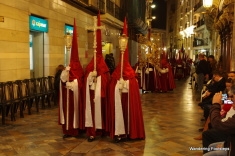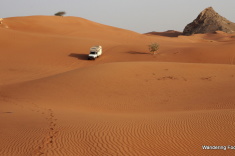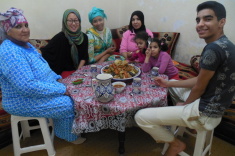“Forty birr per litre,” says the black-market diesel man.
Bruno doesn’t even look down at the dirty yellow container, which is surely carrying an impure mixture of oil and diesel, anyway.
The normal price of diesel is 17 birr per litre (just under $1). But Gondar doesn’t have any left. Actually, the entire region has a diesel shortage.
We’d come to Gondar a day earlier to continue our historical tour of Northern Ethiopia. Gondar had been the capital of Ethiopia in the 17th century, home of a series of emperors. Now it is the site of the ruins of the castles and palaces built by these emperors within a 70,000 square-meter compound, called the Royal Enclosure.
We approach Gondar from Lake Tana below. Sitting at the top of the hill are the domed towers of Fasiladas’ palace, the founding king of Gondar. At 32 meters tall, and the only building not in ruins or in the midst of repairs, it is the most impressive building within the Royal Enclosure.
We spend an afternoon walking around these 17th century ruins. I could be walking through the abandoned grounds of a European nobleman. There are palaces and castles, a Turkish bath, stables, banquet halls, a library and an archive, even a few cages for lions (which were reputably kept here until the 90s!).
In truth, though, I have to imagine the splendour that existed here for over a century. With only a few exceptions, most of the structures are roofless, have half-size walls, and are difficult to identify. It’s a stretch to picture the extensive gardens, opulence, court pageantry, elaborate feasts, and extreme brutality and conspiracy that occurred within these grounds.
.jpg)
Fasiladas’ Castle

The stables.
.jpg)
No roof in Iyasu’s Palace!

Ruins, ruins everywhere!
I guess after Lalibela, Gondar feels a tad underwhelming.
We return to Terera Hotel, one of the oldest in Gondar, on a hill with extensive land. I know that once the gardens here were beautiful, but now they are just overgrown. I know that once the paint on the walls was fresh and the toilets flushed and there was running water. But now I have to draw ant-infested water from a well, and the hallway leading to the “bathroom” (read: a room where you can go to the toilet or take a shower if you haul up your own water bucket) looks like a scene from The Shining.
Today’s Gondar is a far cry from its regal past.
We go out for injira that night. On the way to the restaurant we pass tiny tin boxes elevated slightly from the ground. They look like giant cupboards with sliding doors. Inside are magazine cut-outs pasted onto the walls and soiled blankets on the floor. These are homes. A single man can squeeze himself into one and lie flat if his legs are bent. He can use the “toilet” in the grass behind. This is a neighborhood. It reeks of urine.
Time to leave Gondar behind.
The following morning, we pack up, thank the hotel receptionist, and drive to the town’s gas station to fill up before heading to the Simien Mountains. But there’s no diesel. We check across the street. No diesel there, either. I consult my map of Gondar. There’s a gas station at the northern end of town. We drive there.
“There’s no diesel in Gondar,” says the man in the station. “Maybe tomorrow.” He uses the word tomorrow like they use it in Africa – to mean sometime in the future, maybe.
“There’s always the black market,” Bruno says to me. He’s obviously been in this situation before.
We head back to Terera Hotel (which I’d hoped never to see again) to ask them for help. The receptionists and guards are all keen to help. They all hop on the phone to call friends and contacts for a bit of black market diesel. They’ve obviously done this before.
Initially I’m hopeful. I calculate that we need 40 liters to get to the Simien Moutains and back, by which time surely Gondar will once again have diesel (“I mean, this kind of shortage is rare, right? Without diesel, life stops!”). Ever prudent, Bruno says we should try to get 80 liters, so that we can make it to the border of Sudan, too. My optimism diminishes slightly.
We spend the morning waiting and negotiating, waiting again and negotiating some more. Loads of “helpful” locals show up to solve our fuel needs – we are farenj, foreigners, after all – but the price is so exaggerated, and the quality of the diesel so dubious, that we don’t buy.
“We can wait,” says Bruno. “We are blessed with the gift of time.”
But I don’t want to wait. Not in this murder-scene ant-water bath hotel.
I head off to do some more tourism, leaving Bruno to deal with the diesel waiting-game. Several kilometers out of town is Fasiladas’ Bath, the supposed vacation spot of Gondar’s emperors. The immense rectangular pool sits in a peaceful garden where I can hear more birds chirp than tuk-tuks honk (a welcome respite). Giant tree roots have grown over the walls and outer seating. I sit in the shade and watch a family sweeping the dead leaves from the walkway and think about the amazing pool parties that must have happened here (in inflated goat-skin lifejackets, no less!).

Fasiladas’ Bath

Overgrown tree roots
But in the back of my mind is diesel and the Simien Mountains and the God-forsaken Terera Hotel. Curse us for not filling up our tank when we could have!
When I return to our hotel, Bruno has managed to find 14 liters of diesel at an only-slightly inflated price. He’s also managed to acquire information about the situation – the government has just announced a much lower fuel price, and gas stations, who had purchased their fuel at the higher price, don’t want to dispense it at a loss, so they are holding onto it for now.
It could be days or weeks before this problem is resolved and the diesel free-flows in Gondar. We have just enough diesel in the tank to get us to the Ethiopian border. The Simien Mountains will have to wait another day. We are driving to Sudan tomorrow.
Gondar may have once been a place of splendour and magnificence. But, just like its crumbling castles and palaces, the majesty of Gondar has disintegrated, and it is now but a ruined shell of its glorious legacy.
Goodbye Gondar. Goodbye Ethiopia.

Filling up for Sudan.


